- Home
- George Eliot
Felix Holt Page 8
Felix Holt Read online
Page 8
Under the cold weight of these thoughts Mrs Transome shivered. That physical reaction roused her from her reverie, and she could now hear the gentle knocking at the door to which she had been deaf before. Notwithstanding her activity and the fewness of her servants, she had never dressed herself without aid; nor would that small, neat, exquisitely clean old woman who now presented herself have wished that her labour should be saved at the expense of such a sacrifice on her lady’s part. The small old woman was Mrs Hickes, the butler’s wife, who acted as housekeeper, lady’s-maid, and superintendent of the kitchen – the large stony scene of inconsiderable cooking. Forty years ago she had entered Mrs Transome’s service, when that lady was beautiful Miss Lingon, and her mistress still called her Denner, as she had done in the old days.
‘The bell has rung, then, Denner, without my hearing it?’ said Mrs Transome, rising.
‘Yes, madam,’ said Denner, reaching from a wardrobe an old black velvet dress trimmed with much-mended point, in which Mrs Transome was wont to look queenly of an evening.
Denner had still strong eyes of that shortsighted kind which sees through the narrowest chink between the eyelashes. The physical contrast between the tall, eagle-faced, dark-eyed lady, and the little peering waiting-woman, who had been round-featured and of pale mealy complexion from her youth up, had doubtless had a strong influence in determining Denner’s feeling towards her mistress, which was of that worshipful sort paid to a goddess in ages when it was not thought necessary or likely that a goddess should be very moral. There were different orders of beings – so ran Denner’s creed – and she belonged to another order than that to which her mistress belonged. She had a mind as sharp as a needle, and would have seen through and through the ridiculous pretensions of a born servant who did not submissively accept the rigid fate which had given her born superiors. She would have called such pretensions the wrigglings of a worm that tried to walk on its tail. There was a tacit understanding that Denner knew all her mistress’s secrets, and her speech was plain and unflattering; yet with wonderful subtlety of instinct she never said anything which Mrs Transome could feel humiliated by, as by a familiarity from a servant who knew too much. Denner identified her own dignity with that of her mistress. She was a hardheaded godless little woman, but with a character to be reckoned on as you reckon on the qualities of iron.
Peering into Mrs Transome’s face, she saw clearly that the meeting with the son had been a disappointment in some way. She spoke with a refined accent, in a low, quick, monotonous tone –
‘Mr Harold is drest; he shook me by the hand in the corridor, and was very pleasant.’
‘What an alteration, Denner! No likeness to me now.’
‘Handsome, though, spite of his being so browned and stout. There’s a fine presence about Mr Harold. I remember you used to say, madam, there were some people you would always know were in the room though they stood round a corner, and others you might never see till you ran against them. That’s as true as truth. And as for likenesses, thirty-five and sixty are not much alike, only to people’s memories.’
Mrs Transome knew perfectly that Denner had divined her thoughts.
‘I don’t know how things will go on now; but it seems something too good to happen that they will go on well. I am afraid of ever expecting anything good again.’
‘That’s weakness, madam. Things don’t happen because they’re bad or good, else all eggs would be addled or none at all, and at the most it is but six to the dozen. There’s good chances and bad chances, and nobody’s luck is pulled only by one string.’
‘What a woman you are, Denner! You talk like a French infidel. It seems to me you are afraid of nothing. I have been full of fears all my life – always seeing something or other hanging over me that I couldn’t bear to happen.’
‘Well, madam, put a good face on it, and don’t seem to be on the look-out for crows, else you’ll set other people watching. Here you have a rich son come home, and the debts will all be paid, and you have your health and can ride about, and you’ve such a face and figure, and will have if you live to be eighty, that everybody is cap in hand to you before they know who you are – let me fasten up your veil a little higher: there’s a good deal of pleasure in life for you yet.’
‘Nonsense! there’s no pleasure for old women, unless they get it out of tormenting other people. What are your pleasures, Denner – besides being a slave to me?’
‘Oh, there’s pleasure in knowing one’s not a fool, like half the people one sees about. And managing one’s husband is some pleasure; and doing all one’s business well. Why, if I’ve only got some orange flowers to candy, I shouldn’t like to die till I see them all right. Then there’s the sunshine now and then; I like that, as the cats do. I look upon it, life is like our game at whist, when Banks and his wife come to the still-room of an evening. I don’t enjoy the game much, but I like to play my cards well, and see what will be the end of it; and I want to see you make the best of your hand, madam, for your luck has been mine these forty years now. But I must go and see how Kitty dishes up the dinner, unless you have any more commands.’
‘No, Denner; I am going down immediately.’
As Mrs Transome descended the stone staircase in her old black velvet and point, her appearance justified Denner’s personal compliment. She had that high-born imperious air which would have marked her as an object of hatred and reviling by a revolutionary mob. Her person was too typical of social distinctions to be passed by with indifference by any one: it would have fitted an empress in her own right, who had had to rule in spite of faction, to dare the violation of treaties and dread retributive invasions, to grasp after new territories, to be defiant in desperate circumstances, and to feel a woman’s hunger of the heart for ever unsatisfied. Yet Mrs Transome’s cares and occupations had not been at all of an imperial sort. For thirty years she had led the monotonous narrowing life which used to be the lot of our poorer gentry, who never went to town, and were probably not on speaking terms with two out of the five families whose parks lay within the distance of a drive. When she was young she had been thought wonderfully clever and accomplished, and had been rather ambitious of intellectual superiority – had secretly picked out for private reading the lighter parts of dangerous French authors – and in company had been able to talk of Mr Burke’s style, or of Chateaubriand’s eloquence – had laughed at the Lyrical Ballads and admired Mr Southey’s Thalaba.4 She always thought that the dangerous French writers were wicked, and that her reading of them was a sin; but many sinful things were highly agreeable to her, and many things which she did not doubt to be good and true were dull and meaningless. She found ridicule of Biblical characters very amusing, and she was interested in stories of illicit passion: but she believed all the while that truth and safety lay in due attendance on prayers and sermons, in the admirable doctrines and ritual of the Church of England, equally remote from Puritanism and Popery; in fact, in such a view of this world and the next as would preserve the existing arrangements of English society quite unshaken, keeping down the obtrusiveness of the vulgar and the discontent of the poor. The history of the Jews, she knew, ought to be preferred to any profane history; the Pagans, of course, were vicious, and their religions quite nonsensical, considered as religions – but classical learning came from the Pagans; the Greeks were famous for sculpture; the Italians for painting; the middle ages were dark and Papistical; but now Christianity went hand in hand with civilization, and the providential government of the world, though a little confused and entangled in foreign countries, in our favoured land was clearly seen to be carried forward on Tory and Church of England principles, sustained by the succession of the House of Brunswick,5 and by sound English divines. For Miss Lingon had had a superior governess, who held that a woman should be able to write a good letter, and to express herself with propriety on general subjects. And it is astonishing how effective this education appeared in a handsome girl, who sat supremely well on horseback, sang a
nd played a little, painted small figures in water-colours, had a naughty sparkle in her eyes when she made a daring quotation, and an air of serious dignity when she recited something from her store of correct opinions. But however such a stock of ideas may be made to tell in elegant society, and during a few seasons in town, no amount of bloom and beauty can make them a perennial source of interest in things not personal; and the notion that what is true and, in general, good for mankind, is stupid and drug-like, is not a safe theoretic basis in circumstances of temptation and difficulty. Mrs Transome had been in her bloom before this century began, and in the long painful years since then, what she had once regarded as her knowledge and accomplishments had become as valueless as old-fashioned stucco ornaments, of which the substance was never worth anything, while the form is no longer to the taste of any living mortal. Crosses, mortifications, money-cares, conscious blameworthiness, had changed the aspect of the world for her: there was anxiety in the morning sunlight; there was unkind triumph or disapproving pity in the glances of greeting neighbours; there was advancing age, and a contracting prospect in the changing seasons as they came and went. And what could then sweeten the days to a hungry much-exacting self like Mrs Transome’s? Under protracted ill every living creature will find something that makes a comparative ease, and even when life seems woven of pain, will convert the fainter pang into a desire. Mrs Transome, whose imperious will had availed little to ward off the great evils of her life, found the opiate for her discontent in the exertion of her will about smaller things. She was not cruel, and could not enjoy thoroughly what she called the old woman’s pleasure of tormenting; but she liked every little sign of power her lot had left her. She liked that a tenant should stand bareheaded below her as she sat on horseback. She liked to insist that work done without her orders should be undone from beginning to end. She liked to be curtsied and bowed to by all the congregation as she walked up the little barn of a church. She liked to change a labourer’s medicine fetched from the doctor, and substitute a prescription of her own. If she had only been more haggard and less majestic, those who had glimpses of her outward life might have said she was a tyrannical, griping harridan, with a tongue like a razor. No one said exactly that; but they never said anything like the full truth about her, or divined what was hidden under that outward life – a woman’s keen sensibility and dread, which lay screened behind all her petty habits and narrow notions, as some quivering thing with eyes and throbbing heart may lie crouching behind withered rubbish. The sensibility and dread had palpitated all the faster in the prospect of her son’s return; and now that she had seen him, she said to herself, in her bitter way, ‘It is a lucky eel that escapes skinning. The best happiness I shall ever know, will be to escape the worst misery.’
CHAPTER II
A jolly parson of the good old stock,
By birth a gentleman, yet homely too,
Suiting his phrase to Hodge and Margery
Whom he once christened, and has married since.
A little lax in doctrine and in life,
Not thinking God was captious in such things
As what a man might drink on holidays,
But holding true religion was to do
As you’d be done by – which could never mean
That he should preach three sermons in a week.
Harold Transome did not choose to spend the whole evening with his mother. It was his habit to compress a great deal of effective conversation into a short space of time, asking rapidly all the questions he wanted to get answered, and diluting no subject with irrelevancies, paraphrase, or repetitions. He volunteered no information about himself and his past life at Smyrna, but answered pleasantly enough, though briefly, whenever his mother asked for any detail. He was evidently ill-satisfied as to his palate, trying red pepper to everything, then asking if there were any relishing sauces in the house, and when Hickes brought various home-filled bottles, trying several, finding them failures, and finally falling back from his plate in despair. Yet he remained good-humoured, saying something to his father now and then for the sake of being kind, and looking on with a pitying shrug as he saw him watch Hickes cutting his food. Mrs Transome thought with some bitterness that Harold showed more feeling for her feeble husband who had never cared in the least about him, than for her, who had given him more than the usual share of mother’s love. An hour after dinner, Harold, who had already been turning over the leaves of his mother’s account-books, said,
‘I shall just cross the park to the parsonage to see my uncle Lingon.’
‘Very well. He can answer more questions for you.’
‘Yes,’ said Harold, quite deaf to the innuendo, and accepting the words as a simple statement of the fact. ‘I want to hear all about the game and the North Loamshire hunt. I’m fond of sport; we had a great deal of it at Smyrna, and it keeps down my fat.’
The Reverend John Lingon became very talkative over his second bottle of port, which was opened on his nephew’s arrival. He was not curious about the manners of Smyrna, or about Harold’s experience, but he unbosomed himself very freely as to what he himself liked and disliked, which of the farmers he suspected of killing the foxes, what game he had bagged that very morning, what spot he would recommend as a new cover, and the comparative flatness of all existing sport compared with cock-fighting, under which Old England had been prosperous and glorious, while, so far as he could see, it had gained little by the abolition of a practice1 which sharpened the faculties of men, gratified the instincts of the fowl, and carried out the designs of heaven in its admirable device of spurs. From these main topics, which made his points of departure and return, he rambled easily enough at any new suggestion or query; so that when Harold got home at a late hour, he was conscious of having gathered from amidst the pompous full-toned triviality of his uncle’s chat some impressions which were of practical importance. Among the Rector’s dislikes, it appeared, was Mr Matthew Jermyn.
‘A fat-handed, glib-tongued fellow, with a scented cambric handkerchief; one of your educated low-bred fellows; a foundling who got his Latin for nothing at Christ’s Hospital;2 one of your middle-class upstarts who want to rank with gentlemen, and think they’ll do it with kid gloves and new furniture.’
But since Harold meant to stand for the county, Mr Lingon was equally emphatic as to the necessity of his not quarrelling with Jermyn till the election was over. Jermyn must be his agent; Harold must wink hard till he found himself safely returned; and even then it might be well to let Jermyn drop gently and raise no scandal. He himself had no quarrel with the fellow: a clergyman should have no quarrels, and he made it a point to be able to take wine with any man he met at table. And as to the estate, and his sister’s going too much by Jermyn’s advice, he never meddled with business: it was not his duty as a clergyman. That, he considered, was the meaning of Melchisedec and the tithe,3 a subject into which he had gone to some depth thirty years ago, when he preached the Visitation sermon.4
The discovery that Harold meant to stand on the Liberal side – nay, that he boldly declared himself a Radical – was rather startling; but to his uncle’s good-humour, beatified by the sipping of port-wine, nothing could seem highly objectionable, provided it did not disturb that operation. In the course of half an hour he had brought himself to see that anything really worthy to be called British Toryism had been entirely extinct since the Duke of Wellington and Sir Robert Peel had passed the Catholic Emancipation Bill; that Whiggery, with its rights of man stopping short at ten-pound householders,5 and its policy of pacifying a wild beast with a bite, was a ridiculous monstrosity; that therefore, since an honest man could not call himself a Tory, which it was, in fact, as impossible to be now as to fight for the old Pretender,6 and could still less become that execrable monstrosity a Whig, there remained but one course open to him. ‘Why, lad, if the world was turned into a swamp, I suppose we should leave off shoes and stockings, and walk about like cranes’ – whence it followed plainly enough that, in t
hese hopeless times, nothing was left to men of sense and good family but to retard the national ruin by declaring themselves Radicals, and take the inevitable process of changing everything out of the hands of beggarly demagogues and purse-proud tradesmen. It is true the Rector was helped to this chain of reasoning by Harold’s remarks; but he soon became quite ardent in asserting the conclusion.
‘If the mob can’t be turned back, a man of family must try and head the mob, and save a few homes and hearths, and keep the country up on its last legs as long as he can. And you’re a man of family, my lad – dash it! you’re a Lingon, whatever else you may be, and I’ll stand by you. I’ve no great interest; I’m a poor parson. I’ve been forced to give up hunting; my pointers and a glass of good wine are the only decencies becoming my station that I can allow myself. But I’ll give you my countenance – I’ll stick to you as my nephew. There’s no need for me to change sides exactly. I was born a Tory, and I shall never be a bishop. But if anybody says you’re in the wrong, I shall say, “My nephew is in the right; he has turned Radical to save his country.” If William Pitt had been living now, he’d have done the same; for what did he say when he was dying? Not “O save my party!” but “O save my country, heaven!”7 That was what they dinned in our ears about Peel and the Duke; and now I’ll turn it round upon them. They shall be hoist with their own petard. Yes, yes, I’ll stand by you.’

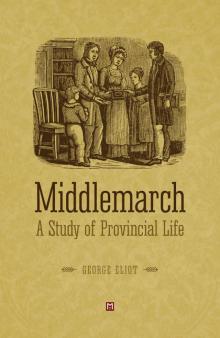 Middlemarch
Middlemarch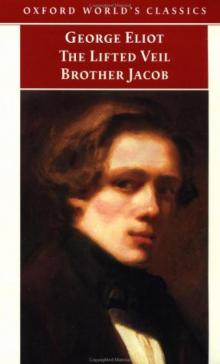 Brother Jacob
Brother Jacob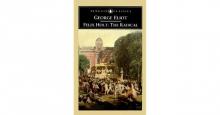 Felix Holt, the Radical
Felix Holt, the Radical Mr Gilfil's Love Story
Mr Gilfil's Love Story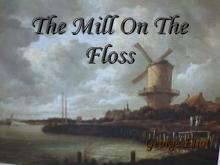 The Mill on the Floss
The Mill on the Floss Silas Marner
Silas Marner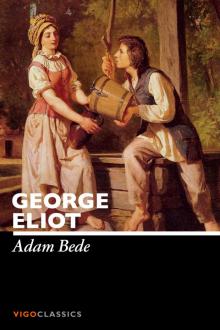 Adam Bede
Adam Bede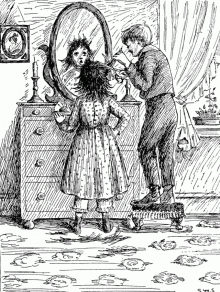 Tom and Maggie Tulliver
Tom and Maggie Tulliver The Damn Fool
The Damn Fool The Lifted Veil
The Lifted Veil Scenes of Clerical Life
Scenes of Clerical Life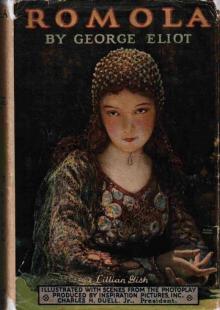 Romola
Romola Daniel Deronda
Daniel Deronda Felix Holt
Felix Holt